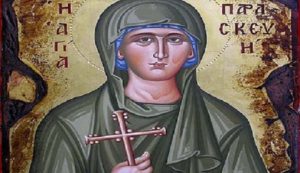A saint who passed through fire and iron The Holy Blessed Martyr Paraskevi (26 July)
26 Ιουλίου 2016
This saint lived in the time of Emperor Antoninus, in the year 140, and came from a village of Old Rome. She was the daughter of Christians called Agathon and Politeia, who observed the commandments of the Lord scrupulously. They were childless and constantly besought the Lord to send them one.
God, who fulfills the wishes of those who venerate Him, granted them a daughter, whom, at her Holy Baptism, they named Paraskevi, because she was born on Friday, the day of preparation. The child devoted herself to God from the time she was still in her mother’s arms. She was taught by her mother and encouraged by her. Once she had learned to read, she constantly studied the Scriptures and spent much of her time in God’s Church, engaged in prayer. When her parents died, however, she gave away all her possessions to the poor, donned the monastic habit and became a nun, and went out into the world preaching the name of Christ as our true God. In this way, she brought many idolaters to knowledge of God. Some Jews, however, slandered her to the then emperor, Antoninus, saying that a woman called Paraskevi was preaching about Jesus the son of Mary, whom their ancestors had crucified.

As soon as he heard this, the emperor ordered the saint to be brought before him. On seeing her, however, he was struck most forcibly by her good sense and beauty and so he said: ‘Daughter, if you’re convinced by my words and sacrifice to the gods, you’ll inherit many goods and gifts. If you’re not convinced, however, you should know that I’ll hand you over to be tortured’.
Then the saint replied boldly: ‘Never let it be said that I would deny the name of Christ my God’. As the prophet says, ‘May the gods which did not create the earth and the sky disappear from the face of the earth’ (Jeremiah 10, 11). The emperor was furious and ordered an iron helmet to be made red-hot and to be placed on the head of the Saint. This was done, but Paraskevi remained cool and protected and came to no harm. When they saw this miracle, many of the idolaters believed in Christ from that hour.
The emperor then ordered a cauldron to be filled with oil and pitch and to be heated to boiling point. Into this, they cast the Saint. But even in this fiery cauldron, the saint appeared to be cool. Seeing this, the emperor said ‘Sprinkle some of that oil and pitch on me, Paraskevi, so I can tell if it’s really hot’. Taking some in her hands, she threw it at the emperor’s face, blinding him immediately. He cried out in a loud voice: ‘Have mercy on me, servant of the true God and I’ll believe in the God you’re preaching’. His sight was immediately restored and he believed in Christ, both him and his guards, and they all received Baptism in the name of the Holy Trinity. On leaving that place, Saint Paraskevi went around other towns and villages preaching in the name of Christ.
She then went to another town, which was ruled by a man called Asclepius and she was brought before him. Having invoked the name of Christ and made the sign of the Honourable Cross, she declared herself a Christian and preached Christ as the God of earth and heaven. When he heard this, the governor was troubled and had her sent to a terrifying serpent which lived outside the town. It was a custom there to do this with people condemned to death, because the serpent would devour them. When the saint went to this place, the serpent saw her, whistled loudly and opened its mouth to let smoke pour from it. The saint went up to the dragon and said: ‘The wrath of God has come upon you, beast’ and made the sign of the Cross. The dragon whistled loudly again and was then rent in twain and disappeared. When the ruler and his associates saw this, they all believed in Christ.
When the saint left there, she went to another town governed by one Tarasius. When he heard about the Saint, he had her brought before a court. When asked, the Saint confessed that she was a Christian and that Christ was the true God. She was then cast into a cauldron filled with oil, pitch and lead and a fire was lit underneath it. An Angel of the Lord appeared, however, and cooled both the cauldron and what was in it. So the martyr of Christ was unharmed. The inhuman tyrant subjected her to other tortures, but was unable to shake her firm faith. In the end, he had her beheaded and so her soul passed triumphantly into the eternal abode.





